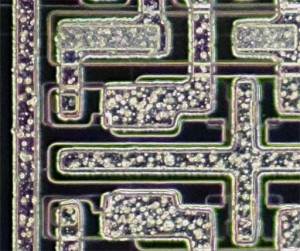In determining your collecting goals, it is important to come to grips with the type of collector you are. The primary types are Hobbyists, Collectors, Historians, and Investors. Generally, all chip collectors display some attributes of each of the “collector” archetypes that follow.
The Hobbyist
Hobbyists are chip collectors that prefer to display their chips in working computers, boards, or prototypes. The interest is in the functional characteristics of the processors. Hobbyists often are interested not just in the processors, but also the other chips the manufacturer made to support the processor. Hobbyists are more interested in the operational status of a chip versus the cosmetic appearance.
The Collector
Collectors generally may or may not display their chips. Generally, Collectors are focused on specific types of chips and attempting to collect all of those chips and any chip package variations. Collectors are inclined to care more about characteristics that may make a chip unique, more than its operational status or physical appearance. Collectors will often acquire chips they may not be familiar with, but they do recognize that it is a member of the family they are collecting.
The Historian
Historians generally display their chips within a historic or technical context. The Historian is more interested in acquiring the history associated with the technological advance the chip represents. Historians, generally, will not acquire a chip unless they know something about the history surrounding the chip. In addition to the actual chip, Historians are interested in marketing brochures, magazine advertisements, and technical literature to help place the chip’s role in history. Historians are generally interested in the condition and state of the chip, but also value the operational status.
The Investor
The Investor is a relatively new comer to the chip collecting scene. Investor’s may, or may not, have real interest in the functions or history of chips. The Investor is interested on the return on their investment. Investing in chips is an interesting concept. Frankly most of the other collectors types will, at least reluctantly, acknowledge that they believe their collection is worth more than they paid for it. If you believe yourself to be this type of collector, then you need recognize that investing in chips is like any other investment you must buy quality and be willing to hold it. Quality is defined by condition and status. Condition is defined in my section of chip condition. Status is really two thing supply and demand. You can read about the challenges of determining supply in my section on chip rarity, however, if you can find early prototypes, manufacturer special versions, or other “limited editions” you can prove limited quantities. Demand comes down to brand name recognition, 1st of kind, and market changer. Chips with cache have much higher demand. So, if you have something rare, than everyone wants, well, you’re in the money. If you plan on investing in a big way, you’ll need to spend extra attention on chip storage and security.
Most collectors are either Hobbyist/Collectors or Historian/Collectors. There are a very few true Hobbyist/Historians, but they are a somewhat conflicted bunch. There is a basic conflict between the Hobbyist and the Historian. The Historian is keen on preserving history and that generally translates into keeping chips in the most pristine condition possible. The Hobbyist, on the hand, is willing to sacrifice the state and condition of a chip, to demonstrate its use and functionality. Many Hobbyists view themselves as teachers, sharing the vintage technology. In this context, they are probably more effective than the Historian in this pursuit. The Historian would view this as a short lived experiment which ultimately degrades the chip.
One other collecting “destination” of chips is the Computer Collector. Vintage chips are often needed to restore vintage computers. Computer Collectors are not generally chip collectors and acquire chips only for the good of the computer. There is an uneasy relationship between Chip Collectors and Computer Collectors. Computer Collectors are concerned that Chip Collectors destroy vintage computers and boards to acquire chips. And to be honest, this does happen. However, most diligent chip collectors will not allow this to happen to collectible computers and boards. Computer Collectors often turn to Chip Collectors for the chips they need. Historians are more likely to part with chips in order to return a vintage computer to operational status.

